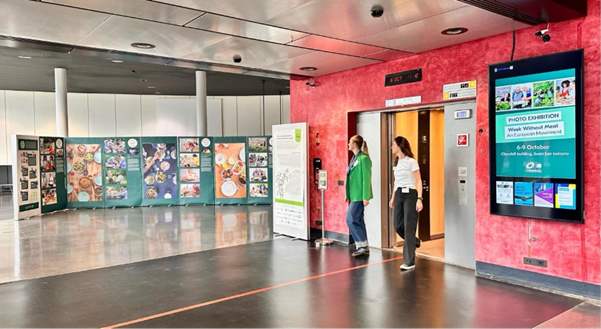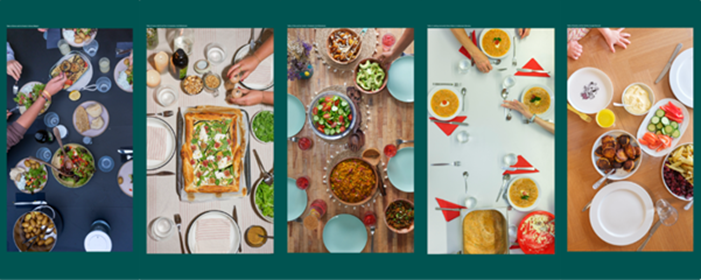
An intimate photo exhibition marks a European milestone for sustainable eating.
From 6-9 October 2025, the Week Without Meat celebrated a remarkable achievement: 10 million participants across Europe. To mark this milestone, the foundation presents a photo exhibition at the European Parliament in Strasbourg, coinciding with the plenary week when all Members of Parliament are gathered.
The exhibition, titled “Week Without Meat: A European Movement,” captures how the campaign has inspired people throughout Europe to explore plant-based eating - not through theory, but through the universal language of food. From cozy family dinners in Denmark to a cooking community in Germany, the series reflects how culture, community and tradition shape our choices at the table.
Supported by Anna Strolenberg (Volt), the exhibition shares authentic moments of vegetarian meals in five countries. Strolenberg, who advocates for sustainable innovation and food culture within Europe, explains:
“Food is the foundation of our future — complex, essential, and ripe for change. With 72% of Europeans ready to adapt for the planet, building a climate-smart Europe is our shared mission. At Volt, we want to connect innovation with the rich European food culture, alternative proteins have their place on our plate. It's all about more choice, more taste and a healthier body and planet.”
Through the lens of Dutch photographer Vivian Keulards, visitors are invited into the kitchens and dining rooms of people who took part in the Week WIthout Meat campaign in their country. These are ordinary Europeans who decided to make a small, meaningful change. Their stories, diverse and deeply human, are the beating heart of this European milestone; the celebration of ten million participants across Europe.
Each portrait in the exhibition tells a story of personal motivation and cultural connection, showing how a single week without meat can spark lasting inspiration.

Dina (35) and her family: her son Jadiliño (15), partner Steven (41), mother Philippa (60), and father Jan (65). Dordrecht, the Netherlands – August 24, 2025.
For eight years, Dina (in the orange dress) and her family have joined the Dutch National Week Without Meat & Dairy. For Dina, plant-based cooking is not just about health and sustainability, but also about joy. She loves preparing jollof, a West African rice dish traditionally served with chicken, but always fully plant-based in her kitchen. “Cooking this way is fun and creative” she says, “I want to show others how they can do this too.”
Her journey began 16 years ago, during pregnancy, when eating a lot of meat did not feel natural to her anymore. “I started wondering what my baby was actually consuming.” That was the start of a long shift, which over time inspired her family as well. Steven admits he once thought bacon would be the hardest thing to give up, “but I don’t even miss it anymore, it’s mostly habit.” Even Steven’s younger brother and his family changed their diet under Dina’s influence and now eat meat only on Sundays.
In Ghana, where Dina has roots, meat symbolizes wealth, hospitality, and celebration. “That makes my choice harder for my community to understand,” she explains. But her approach is to lead with love and flavor: “There are many prejudices about plant-based food. My trick is simple: come and taste.” Since 3 years she opens up her house for people to come and eat during the Week Without Meat & Dairy in the Netherlands. This year, she even encouraged local entrepreneurs in Dordrecht to participate. For Dina, it all comes down to one thing: “If it tastes good, people will follow.”

Simon (24) and his childhood friends Charlie (23), Vadim (23) and Baptiste (23). Ghent, Belgium.
For Simon (the boy in the blue t-shirt) it all started with documentaries. He just graduated as a filmmaker and after watching Cowspiracy, he gave up red meat: “Cows are such beautiful animals. The industry behind it is sickening.” Three years later, after seeing David Attenborough’s Oceans, he stopped eating fish as well: “You could see how trawling wipes out entire seabeds. Nothing remains.” Since then, Simon has followed a “weekday veg lifestyle”: fully vegetarian during the week, and sometimes meat on weekends when visiting friends or family. Red meat and fish, however, are gone for good. His dream is to one day make a film like Oceans. “Through my films, I want to raise awareness and inspire change.”
Convincing those around him isn’t always easy, but his family now mostly eats chicken instead of red meat. And together with his childhood friends from the scouts - where they learned to build fires, gather food, and live close to nature - the topic comes up often. The group eats far less meat these days. “At a BBQ you see it most clearly: so much meat always ends up wasted.”
Ghent itself, Simon feels, supports his choices. “It’s a progressive city. Festivals are becoming more and more veggie, there are many bike streets and car-free zones. That gives me hope.” Still, he worries about globalization and its impact on nature and climate. “Eating less meat would be the best step,” he says matter-of-factly. “But other everyday choices matter too: not eating avocados every day, using less plastic. Small changes add up.”

Caroline (28) and her husband Michael (31), their daughter Martha (2) and a baby boy on the way. Langå, Denmark.
In Michael and Caroline’s household, they eat vegetarian meals three to four times a week. Their daughter Martha joins in as well. For a while, she even refused to eat any meat, much to the surprise of healthcare workers who at that time insisted she had to eat it for protein. But she got plenty from beans and chickpeas. “I can put anything on her plate, but if I add beans to a dish, she actually eats” Caroline laughs. These days, Martha eats a little meat occasionally, but her favorite remains black beans.
Caroline herself started eating more vegetarian meals when she moved out of her parents’ house. For young Danes, this is not unusual: sustainability is one motivation, but just as important is the fact that meat is expensive in Denmark. “If I had to make meatballs for ten guests, we would go bankrupt,” she jokes.
Still, the social context can be challenging. In Denmark, meat is often seen as a right, and it remains one of the country’s key export products. “Older people sometimes say: I don’t get full from vegetables,” Caroline explains. But even her father has changed his mind. “Give him beans or lentils and he’s happy, just like his granddaughter.”
Culture, however, is slowly shifting. At schools and daycare, vegetarian options are now available, and offices are beginning to promote “meatless days.” Traditions, though, sometimes hold back change. During the holidays, pork dishes dominate the table, though Caroline is convinced vegetables could just as easily take center stage. What’s missing, she feels, is stronger political support. “Recently, VAT on chocolate was removed. Why not do that for fruits and vegetables instead? Vegetarian meals should be the default, with people adding meat if they want, not the other way around.”

Cooking community Grüne Küche. Andernach, Germany.
In the “Edible City” of Andernach, where herbs, fruits, and vegetables grow freely in public spaces thanks to EU support, a group of locals has been gathering each month for the past year and a half. Known as Grüne Küche, this community of around 25 members, 16 of whom showed up today, cooks exclusively plant-based meals and aims to inspire others through taste and togetherness. The group cooks three courses together, using ingredients from the city gardens or their own. Costs are shared, never more than 8 euros. But their goal goes beyond eating together: they want to inspire others as well. They visit schools five times a year so children can taste vegetables and bring the experience home. “Parents are always surprised how much their kids enjoy it,” explains Helmut, the group’s caretaker. Recently, they cooked with Syrian women, without a common language, but united by food. For Angelica (the woman in the herb garden), it’s about leading by example: “Maybe I change the world a little by living differently.”
The Grüne Küche is part of the Klima-Werkstatt, a broader volunteer initiative that develops ideas for a climate-friendly Andernach. Sustainability, they believe, is not about big words but small actions. “Doing something isn’t so hard,” says Sabine. “If everyone makes a small change, like eating less meat, for example during Eine Woche Ohne Fleisch, or planting bee-friendly flowers, it adds up to something bigger.”

Laura (29), Astrid (28), and Eva (25). Amsterdam, the Netherlands.
Every weekend, whether for brunch, lunch, or dinner, Laura (white blouse), Astrid (red spencer), and Eva (black top) gather around a table. They met online through their French food blogs, but friendship quickly grew over their two shared loves: food and Paris. Eva, a food photographer and the only born-and-raised Parisian of the trio, laughs: “We call ourselves the Frenchies, but all live in Amsterdam now”
“We are foodies, and we have the same taste,” Laura explains. The women explore new restaurants together, ordering different dishes to sample as much as possible. Most of the time, they eat vegetarian. For Laura, the diet switch came when meat started to feel both unappetizing and expensive. “Supermarket meat is just bad quality. And I never knew how to cook it well, like my mother in France does with boeuf bourguignon. And now I don’t miss it.” These days, she only eats meat at family dinners or for special occasions.
On her Instagram blog (@amangeretavoir), that shift has become natural too. “I don’t call myself vegetarian, but I mostly cook and post plant-based recipes. People barely notice. With vegetables you can be so much more creative; how you cut them, how you prepare them. Meat and fish are always a bit… brut.” The girls group favorites include tomatoes, zucchini, cauliflower, asparagus, leeks (“such a French vegetable, so elegant”), and artichokes, which they eat as a French family ritual: leaf by leaf, until reaching the heart, “the best part”.
For the three friends, food blogging remains a hobby, spontaneous and joyful. “Food shouldn’t be a reward or a necessity; it is a pleasure.” Laura says. “Eating together, sharing flavors and conversation. That’s what brings us closer.”
Together, these stories form a mosaic of modern Europe; a continent united not by uniformity, but by shared values of sustainability, creativity and care for future generations. The dining tables in Belgium, France, the Netherlands, Germany and Denmark may look different, but they all tell the same story: that the shift toward a more plant-based diet is already happening, one meal at a time.

The tables of the communities in Belgium, France, the Netherlands, Germany and Denmark. Photography by Vivian Keulards.
The first edition of Week Without Meat took place in the Netherlands in 2018 and has since become an annual national event. The campaign was founded by Isabel Boerdam, known for her food blog ‘De Hippe Vegetariër’ and cookbooks ‘De Vegabijbel’ and ‘De Vega Atlas’.
Since 2023, the European rollout of the campaign has been supported by the European Union under the LIKE-A-PRO project, funded by the Horizon Europe programme. Its goal: to show Europeans how easy, delicious and impactful it can be to eat plant-based more often, and to inspire millions to rethink what’s on their plate.
“With 10 million participants across Europe, we’re seeing a real shift,” says founder Isabel Boerdam. “Food is something we all share. By changing what’s on our plates, we can change the world together.”
Don’t wait for a better world. You might find the solution at the end of your fork.